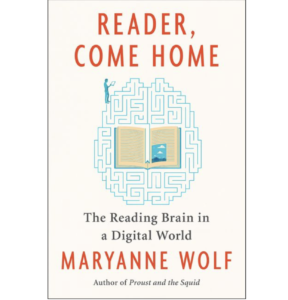 How often do you read in a deep and sustained way fully immersed, even transformed, by entering another person’s world? In her newest book, Reader, Come Home: The Reading Brain in a Digital World,Maryanne Wolf cautions that, the way our engagement with digital technologies alters our reading and cognitive processes, could cause our empathic, critical thinking, and reflective abilities to atrophy. This in turn could undermine our democratic, civil society.
How often do you read in a deep and sustained way fully immersed, even transformed, by entering another person’s world? In her newest book, Reader, Come Home: The Reading Brain in a Digital World,Maryanne Wolf cautions that, the way our engagement with digital technologies alters our reading and cognitive processes, could cause our empathic, critical thinking, and reflective abilities to atrophy. This in turn could undermine our democratic, civil society.
Wolf, the John DiBiaggio Professor of Citizenship and Public Service at Tufts University and the director of the Center for Dyslexia, Diverse Learners, and Social Justice at UCLA, has written a series of nine warm letters to her readers encouraging us to think about the perils of a changing reading culture and promises of supporting media biliteracy in young readers. She argues that we should teach students distinct ways of reading print versus digital sources and help them switch between these modes of reading. Drawing on evidence from across cognitive neuroscience and education and on her own experiences as a teacher, parent, researcher, and non-profit founder, Wolf suggests helpful parenting practices, ways teachers can support reading and digital literacy, and how policy might increase the number of students who can fully immerse themselves in written thought.
As important as reading is to our thinking today, we did not evolve to read and cannot learn to do so without support. It is through an elaborate process of neural recycling—of repurposing brain areas that have evolved for other reasons—that we are able to become readers. With whimsical analogies to the circus Wolf explains how the act of reading even a single word requires coordinated activation across many neurons in regions distributed throughout the brain. She explains properties of attention, vision, sound, and affective processing in the brain that contribute to reading.
Wolf then explores how digital reading may endanger deep engagement with text and empathizing with others by limiting our attention span and background knowledge. Surprisingly, we are reading more than ever before—on average about a hundred thousand words per day. Because we are so overloaded with text, simplifying, skimming, and reading in short bursts are reasonable compensatory mechanisms. Wolf’s concern lies in this skimming style of reading becoming a habit that we exercise across all content. She is troubled by the trends of decreasing empathic abilities among young people, increasing rates of attentional disorders, and increasing susceptibility to “fake news”—all of which have occurred in parallel with a rise in digital reading, media multi-tasking, technologically mediated social interactions, and outsourcing of knowledge to the internet. Deep reading, on the other hand, causes people to take perspectives—a process that requires patience and increases our knowledge of the world and our ability to behave morally.
By fourth grade only a third of children in the U.S. can read deeply. Nearly half of African-American and Latino student are not reading at even a basic level. Wolf offers advice about countering this trend in the digital age. Drawing heavily on The Big Disconnect, Wolf suggests that before age five, children and parents should jointly read physical print-based books as often as possible and largely limit digital reading. Reading to children exposes them to the sounds, visual representations, and word-meanings in our language and builds their knowledge of the world. Schools can support reading by determining students’ readiness to read and helping all students improve, including struggling readers who have been underexposed to text and readers with learning disabilities. Phonics should unequivocally be a part of reading instruction. Teachers in higher grades should learn to teach reading since many of their students may not be proficient. Policy makers can help by investing in early childhood education, literacy, teacher professional development, and equitable access to print and digital media.
Wolf concludes by proposing that, since the next generation will enter a job market primarily based on jobs that do not exist today, we need to support young people in building biliterate brains. That is, they need to learn to work effectively in both print and digital media. As they develop proficiency in both deep and fast ways of reading they will also learn when and how to switch between these modes. Schools should require courses that openly discuss the intriguing and harmful aspects of internet usage, and responsible practices.
A democracy thrives on diversity of ideas, but if citizens are not able to use new technologies, critical thinking, and empathic skills to evaluate those ideas, society will not advance. Wolf’s strategies for supporting reading in a digital age help us improve as readers and help us grow a stronger, more civil democracy.
Wolf, M. (2018). Reader, Come Home: The Reading Brain in a Digital World. New York: Harper Collins.



